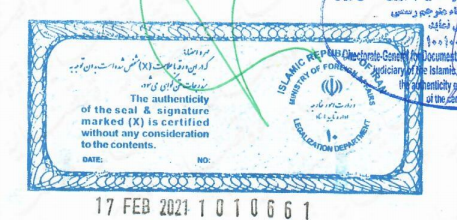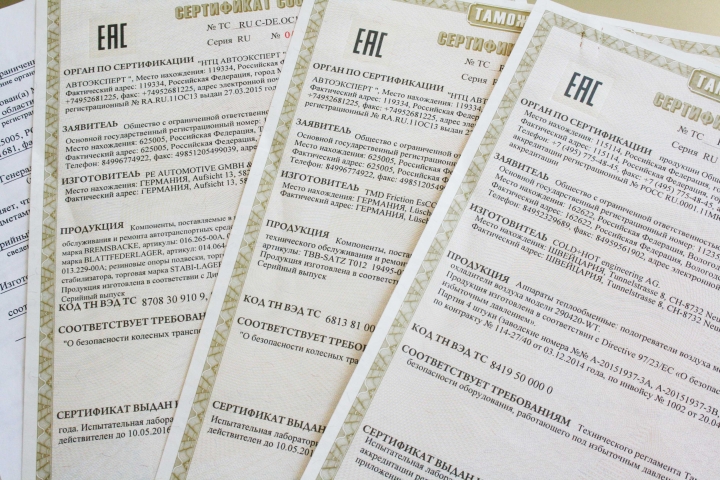Schmidt & Schmidt covers the full spectrum of legalization services for documents issued in Iran.
Iran has not joined the Hague Convention on the Simplified Authentication of Documents. This means that documents from Iran cannot be legalized by apostille, they will only be recognized abroad after they undergo consular legalization.
Similar to the apostille, authentication methods validate documents by confirming the authenticity of their stamps, seals, and signatures. This includes embassy legalization procedures, which provide an additional layer of document verification. Such processes ensure credibility and are used to make documents acceptable in nations that haven't signed the Hague Convention. However, there's a difference: while apostilles are universally accepted among Hague Convention signatory countries, documents that have undergone authentication and legalization are only valid in the specific countries where they have been legalized.
Therefore, in Iran, one cannot obtain an apostille. Instead, documents must undergo the authentication and consular legalization process.

Designated Competent Authorities in Iran
In Iran, documents requiring legalization will need to go through the Ministry of Justice or the Ministry of Foreign Affairs. In addition, there are a number of representations and embassies of Iran all over the world, depending on a specific country.
In order to complete the legalization process seamlessly, your documents will usually need to pass through a few steps. First, the document gets an official stamp in Iran. Then, it gets another stamp from the embassy or consulate of the country where you want to use the document, which is located in Iran. This makes sure the document is recognized and accepted in the other country.
The responsible authorities will carefully examine the document to verify if the signatures, stamps, or seals align with their own records. If they are confirmed to be authentic, the document will be legalized.
In Iran, legalization means a document will be confirmed by an official in Persian/Farsi or English, with a handwritten signature of an official, an official seal.
Legalization of Iran educational documents for use abroad
For educational documents issued in Iran, such as school reports, university degree certificates, transcripts of records, enrollment certificates, and other school or university certificates, to be recognized and valid abroad, they must undergo an authentication process through legalization.
Educational certificates from Iran must bear the attestation from the Ministry of Foreign Affairs. This is sometimes referred to as attestation, a process that ensures document's genuineness to the receiving institution or nation. For Iranian documents, this typically means undergoing multiple attestations from various governmental departments, both within Iran and in the foreign nation where the document will be used.
Such an approach ensures that educational documents possess the necessary legal authority, allowing them to be recognized and used across various countries. While these are general procedures, the exact requirements may vary, so it is advisable to confirm the specific steps with the relevant authorities.
Consular legalization of Iran documents for use abroad
Consular legalization is the process of authenticating or certifying a legal document so a foreign country's legal system will recognize it as with full legal effect that is carried out by the diplomatic or consular mission of the country in which the document is to be used.
This procedure is required when the destination country does not recognize or accept the apostille certification. One needs to submit the original document, along with any required copies or supporting materials, to the respective consular office. The consular officials will review the document, verify its authenticity, and affix their seal or stamp to certify its validity.
The consular legalization process may require additional steps like obtaining translations of the document into the language of the destination country or providing additional supporting documentation as requested by the consular office.
If the document originates from outside Iran, the document's owner must follow a two-step process: ratifying it at the Ministry of Foreign Affairs in the document's country of origin and then at an embassy or consulate of Iran within that country. It's essential to avoid making any modifications or additions to the document's information, as this could nullify the ratification.
It is up to the diplomatic mission to decide about the authentication procedure. The specific requirements and procedures for consular legalization may vary depending on the regulations of the destination country.
Сonsular legalization in all cities of Iran
Schmidt & Schmidt provides consular legalization services for public documents originating from all regions across Iran. We handle the entire process, from document review to obtaining the necessary certifications, ensuring that your documents are valid and recognized internationally. With our reliable services, you can confidently use your Iran public documents abroad.
Procurement of documents from Iran
If the important documents are lost or damaged, or current copies of the documents are needed, the re-issue of the documents is required. It is not unusual for people outside Iran to encounter difficulties with obtaining new documents when abroad. Our consultants will help you procure new documents from Iran remotely, and we can arrange for your documents to be sent by courier anywhere in the world.
Certified translation of documents from Iran
Copies and transcripts of civil status documents can be translated into any language by a sworn translator in Iran or the translation can be done in the country of destination. We offer certified translations of civil status documents with further certification. The cost of the work is calculated according to the volume of the document in question.


























































